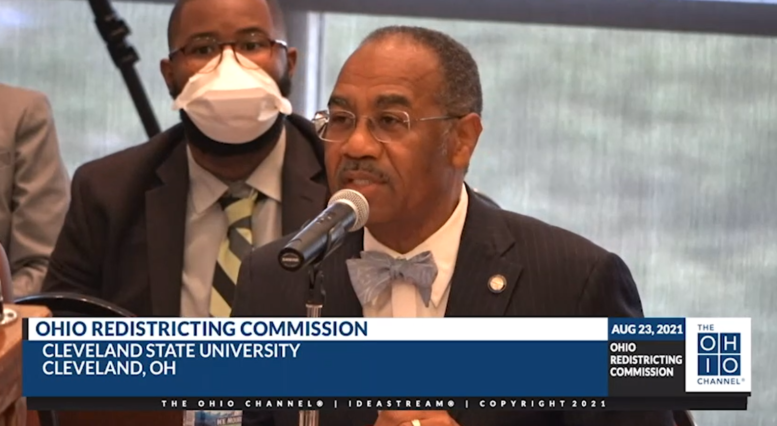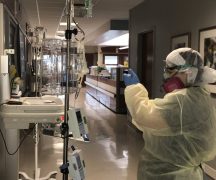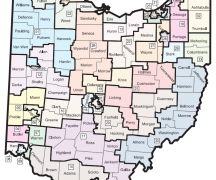Several commission members absent, including Gov. DeWine who instead attended a Bengals practice
BY SUSAN TEBBEN
A week of double-header public hearings on redistricting began Monday in Cleveland and Youngstown, with members of the public calling for more fair districts.
Ohioans shared with the Ohio Redistricting Commission stories of unrepresentative and oddly-drawn districts (including the “snake on the lake” of Ohio’s 9th district, so-called because of it’s long, skinny appearance on the map), and urged the commission to keep the process transparent and the mapmaking fair.
“There are things that we like and things that we don’t like, but no matter how you slice it, you need to slice it fairly,” said Rita Mayhew, a retired teacher from Lorain.
Speakers at the hearings on the Cleveland State University and Youngstown State University campuses, touched on the impact of redistricting and gerrymandering on everything from education to abortion rights and being an informed voter.
Former Democratic state representative, John Patterson, co-author of the Fair School Funding Plan and Ashtabula County resident, said at the Youngstown hearing that the current legislative districts “lend themselves to candidates who either lean left or lean right, and in the extreme, force potential candidates to run further left or further right.”
“We need to work together, but we need the opportunity to do just that,” Patterson said. “And fairly drawn districts give us that opportunity.”
Some in the packed meeting rooms expressed outrage as members of the commission sent proxies, rather than attending themselves.
“We have put aside everything to come here today, and we are not getting the same response from the people who are supposed to be on this commission,” said Cleveland Heights resident Sue Dyke.
At Monday morning’s Cleveland hearing, Auditor of State Keith Faber attended, along with House Minority Leader Emilia Sykes, D-Akron, and commission co-chair, state Sen. Vernon Sykes, D-Akron.
House Speaker Bob Cupp, Secretary of State Frank LaRose, Gov. Mike DeWine and Senate President Matt Huffman all sent designees in their place.
For Cupp, state Rep. Scott Oelslager, R-North Canton, stood in; LaRose sent chief of staff Merle Madrid. DeWine’s chief legal counsel Matthew Donahue sat in on his behalf, and Huffman sent state Sen. Theresa Gavarone, R-Bowling Green.
At the afternoon meeting in Youngstown, Faber and Sen. Sykes were both in attendance, but stand-ins were still present for Cupp, DeWine, LaRose and Huffman. State Rep. Timothy Ginter, R-Salem, was in for Cupp this time and state Sen. Kirk Schuring, R-Canton, was in for Huffman.
Donahue was again in for DeWine, and Madrid repeated his proxy appearance for LaRose.
Minority Leader Emilia Sykes also sent a proxy to that meeting, state Rep. Michele Lepore-Hagan, D-Youngstown.
One speaker at the Youngstown hearing noted that DeWine was attending a practice with the Cincinnati Bengals. A number of sports reporters posted pictures and videos of DeWine on the sidelines of Monday’s practice.
Official statement (from Governor’s press secretary) on Governor Mike DeWine’s visit to #Bengals camp:
The Governor enjoys supporting all Ohio professional sports teams. He visited Browns camp last week and was looking forward to his visit to Bengals camp today. pic.twitter.com/cCTrG0ph5H
— Joe Danneman (@FOX19Joe) August 23, 2021
DeWine’s spokesperson Dan Tierney said the governor intends to take into consideration the information given at the hearings, but also said the hearings “are not official committee hearings, these are listening sessions.”
Asked whether the DeWine will attend any of the hearings, Tierney said that is “yet to be determined” and his calendar has not been finalized.
A spokesperson for Huffman said the Senate president chose to let representatives from the districts where the hearings were occurring to attend in his place.
“President Huffman believes this is an important opportunity to give members from the regions around the state where the hearings are held to participate in a process that only happens once in a decade,” said spokesperson John Fortney.
Fortney said Huffman plans to attend the hearing set to happen Thursday at Ohio State University’s Lima campus, in his district.
LaRose’s office said the secretary “was supposed to be on orders from the U.S. Army, but as with many things with the Army, those are constantly changing and we expect him to be able to attend upcoming hearings.”
A spokesperson Cupp did not respond to a request for comment.
Another criticism hitting commission members was the time of the meetings, which some speakers said kept those who work during the day and can’t afford to take a day off from being able to speak at their local meetings.
“The hope is that you all understand that their interests need to be represented even though they’re not here, even though they may not have voted for you, even though they may not have voted,” said Reginald Williams, an attorney and Shaker Heights resident.
Even the one person in either hearing who publicly denied the idea of gerrymandering and charged that Republicans had instead “dominated” elections in the past, causing their supermajority, said the commission should have more hearings. Those hearings should be held at locations other than universities, he said.
“You do not have a representative cross-section of Ohio in this room,” said Thomas Hach, a Concord resident. “This is wrong, you need to have another week of hearing from the people.”
The other hearing locations and dates can be found on the Ohio Redistricting Commission website.
***
Also from Ohio Capital Journal:
School vaccine records missing for tens of thousands of Ohio students
School vaccination records were missing or incomplete among roughly 1 in 5 sampled Ohio middle and high school students last year, despite state law requiring local boards of education to track immunizations records of all enrolled students.
All Ohio students, per state law, must be vaccinated against mumps, tetanus, polio, measles, Hepatitis B, chicken pox and meningococcal diseases. They can claim exemptions in writing due to natural immunity from prior infection; a medical contraindication; or for “reasons of conscience, including religious convictions.”
Though the law requires local boards of education to keep immunization summaries available on request for inquiring parents, schools statewide are failing to track vaccination among tens of thousands of students.
“The question is, why are the schools not collecting this data?” said Madhav Bhatta, an epidemiologist at Kent State University. “If it’s required by law that every child either get vaccinated or have a medical exemption … then why is there missing data?” READ MORE
Interim state superintendent named yet again
A new interim state superintendent will hold down the fort at the Ohio Department of Education, following the departure of the previous interim superintendent.
Dr. Stephanie K. Siddens, currently the senior executive for the state’s Center for Student Supports, will take over in September, after current superintendent Paolo DeMaria officially retires. The Ohio State Board of Education approved Siddens as interim head at a special meeting on Monday.
Siddens has been with the Ohio Department of Education since 2006, working as assistant director and director for the Office of Early Learning and School Readiness, and as senior executive director for the Center for Curriculum and Assessment, before taking her current job.
Deputy State Superintendent John Richard had previously been picked by the state school board to fill the interim spot, but on August 10, Richard announced he’d be leaving the department.
Media reports say Richard took a job as president of the Stark Education Partnership in Stark County.
FDA grants full approval to Pfizer’s COVID-19 shot
WASHINGTON — The U.S. has its first fully approved vaccine against COVID-19, with federal health officials announcing Monday the approval of Pfizer-BioNTech’s two-dose vaccine.
The green light from the U.S. Food and Drug Administration to move Pfizer’s vaccine from emergency use to full approval is a milestone in the national pandemic response, and one that comes as the country battles another surge in infections and hospitalizations due to the delta variant.
The Pfizer vaccine is the only one of the three shots being used under an emergency authorization so far to gain the FDA’s full approval. Moderna also has submitted an application for full approval, while Johnson & Johnson has said it will do so for its one-dose shot by the end of the year. READ MORE






